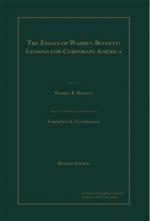
|
| Name: _________________________ | Period: ___________________ |
This test consists of 15 multiple choice questions and 5 short answer questions.
Multiple Choice Questions
1. Buffett stated that his position with any stock repurchase does not imply acceptance of _______, which he calls extortion.
(a) Blackmail.
(b) Blue chip mail.
(c) Redmail.
(d) Greenmail.
2. _________ was spurious, to Buffett, compared to depreciation charges for deteriorating assets.
(a) Stock market value.
(b) Amortization.
(c) Annual reporting.
(d) Acquisition investment.
3. The goal of the partners was to maximize the real economic benefits, not just the number of ___________.
(a) Enterprises.
(b) Properties.
(c) Shares.
(d) Checks.
4. What is NOT one of the three excuses often given by an overpaying buyer, according to the book?
(a) The buyer must grow.
(b) Buyer's stock is undervalued.
(c) Will be worth less in the future.
(d) Will be worth more in the future.
5. Buffett and Munger promise to never ________ unless they are selling at a market price well below intrinsic business value.
(a) Lower dividends.
(b) Exchange shares.
(c) Repurchase shares.
(d) Liquidate assets.
6. Main _______ changes allowed cash-basis accounting for the costs of a corporation.
(a) Tax.
(b) Requirement.
(c) Valuation.
(d) Reporting.
7. Buffett and Munger run the business so that all ___________ gain proportionately.
(a) Companies.
(b) Shareholders.
(c) Banks.
(d) Lending agencies.
8. Any new investment must use a lot of large amounts of _________, according to the book.
(a) Management.
(b) Energy.
(c) Meetings.
(d) Capital.
9. Buffett discussed the popularity of _________ buyouts as they had a number of different benefits to them.
(a) Bored.
(b) Discussed.
(c) Leveraged.
(d) Averaged.
10. Buffett believed that _______ data was important to his and Munger's decision making.
(a) Stock.
(b) Business.
(c) Accounting.
(d) Investor.
11. Buffett realized that it was helpful to be _________ when others were fearful in the market.
(a) Standoffish.
(b) Fast.
(c) Slow.
(d) Greedy.
12. How many shareholders did a business that wanted to be on the NYSE have to have?
(a) 10,000.
(b) 5000.
(c) 100.
(d) 2000.
13. Buffett avoids _________ share value to existing shareholders by true value for value merger, using stock as inflated currency.
(a) Stabilizing.
(b) Dispersing.
(c) Increasing.
(d) Diluting.
14. Major business activities grouped together aided _____ by providing data in a more useful form.
(a) Analysis.
(b) Future goal setting.
(c) Stock prices.
(d) Investments.
15. ________ took fictional accounting actions that showed absurd accounting manipulations to let it undersell all competition to dominate the industry.
(a) Coca-Cola.
(b) GEICO.
(c) US Steel.
(d) Pepsi.
Short Answer Questions
1. If the buyer's stock was sold at less than intrinsic value, he bought with undervalued _________ and would suffer an unequal exchange.
2. The question of an exchange of stock arose in 1983 during the merger of Berkshire and ____________.
3. In the past, the distinction between economic and accounting goodwill was insignificant when Buffett sought firms with tangible _______, rather than firms relying on economic goodwill.
4. What kind of pro told Buffett the piece of information that helped to guide them on the field?
5. _______ transactions only allowed stock be paid compared to a purchase in which cash or stock and cash or other valuable consideration may be paid.
|
This section contains 444 words (approx. 2 pages at 300 words per page) |

|




